HI6025 - IFRS Impact on Australian Accounting Post-Adoption Analysis
VerifiedAdded on 2023/06/12
|10
|2359
|89
Report
AI Summary
This report examines the implications of International Financial Reporting Standards (IFRS) in Australia, particularly following the IFRS adoption period. It focuses on changes in Australian Accounting Standards Board (AASB), accounting policies, and estimates before and after the implementation of IFRS, with specific attention to AASB 29, AASB 27, and AASB 31. The analysis, based on sources like the 2017 study by Firth and Gounopoulos, reveals an increase in assets and liabilities, but a relatively stable overall accounting position in the government sector. The report discusses the challenges faced by local governments in adopting IFRS, including increased labor costs and complexities in public-private partnerships. It also highlights the mixed reactions to IFRS's impact on financial reporting quality, noting potential benefits in net income and stakeholder wealth, as well as complexities in reporting and the need for further research to fully understand the effects of IFRS on the national government. Desklib provides this document and many other resources to help students.
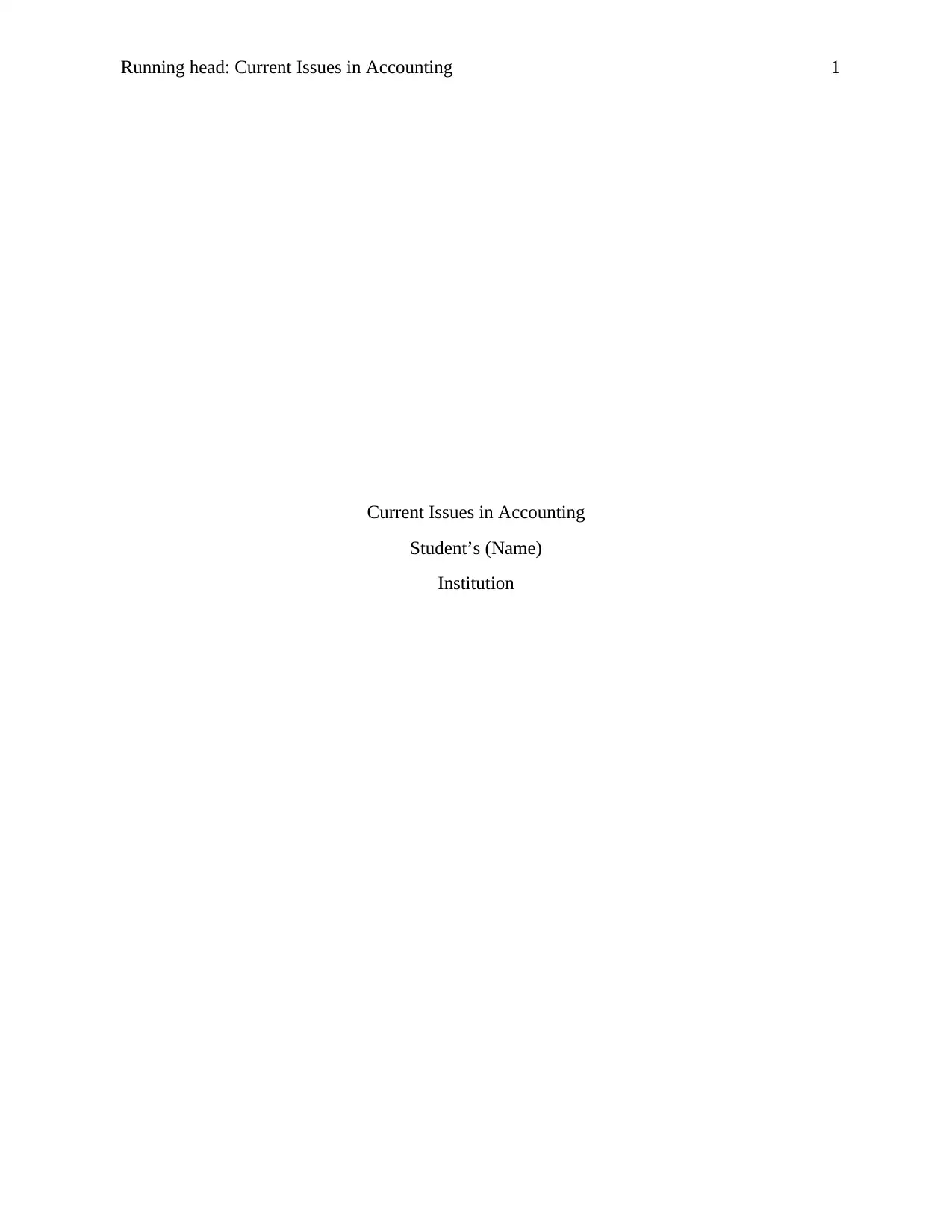
Running head: Current Issues in Accounting 1
Current Issues in Accounting
Student’s (Name)
Institution
Current Issues in Accounting
Student’s (Name)
Institution
Paraphrase This Document
Need a fresh take? Get an instant paraphrase of this document with our AI Paraphraser
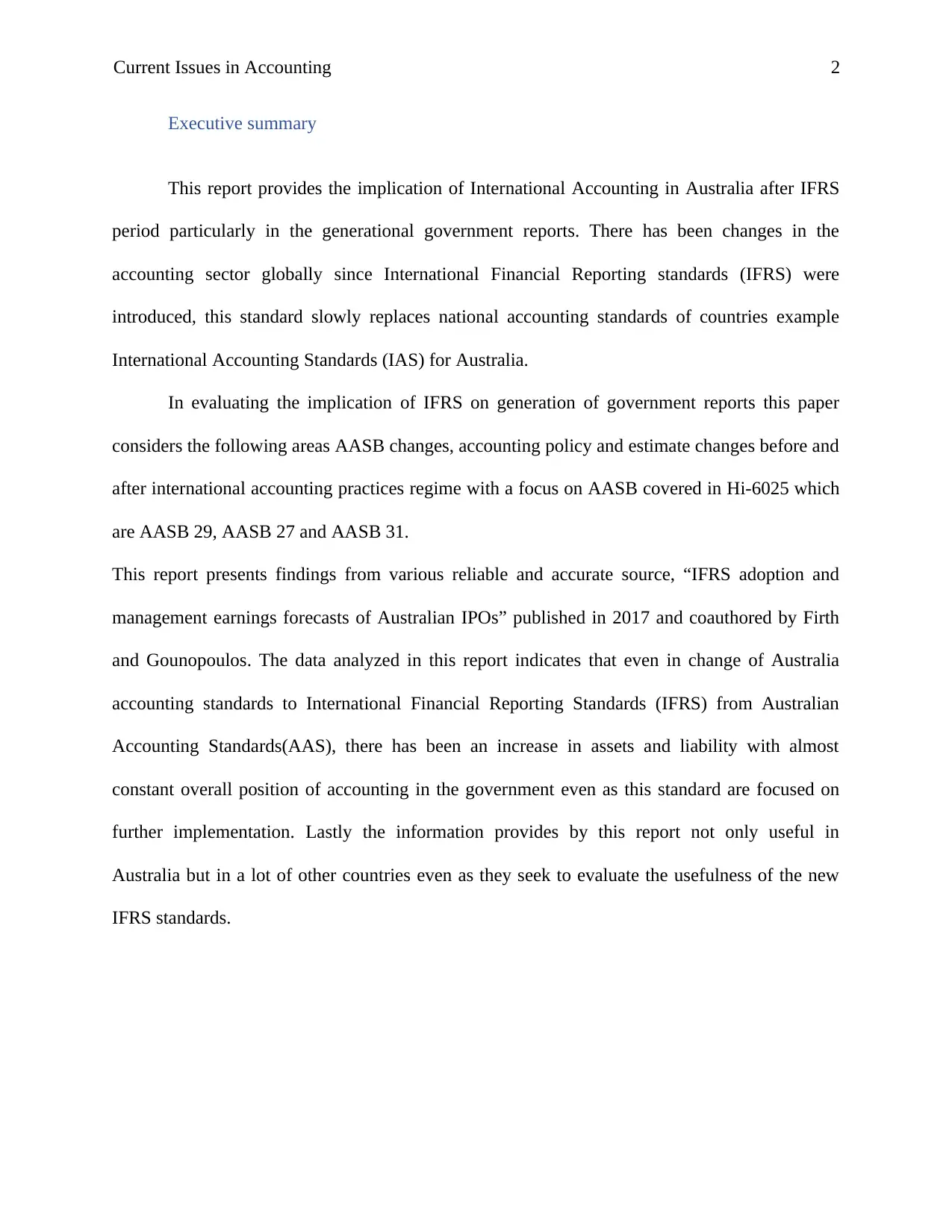
Current Issues in Accounting 2
Executive summary
This report provides the implication of International Accounting in Australia after IFRS
period particularly in the generational government reports. There has been changes in the
accounting sector globally since International Financial Reporting standards (IFRS) were
introduced, this standard slowly replaces national accounting standards of countries example
International Accounting Standards (IAS) for Australia.
In evaluating the implication of IFRS on generation of government reports this paper
considers the following areas AASB changes, accounting policy and estimate changes before and
after international accounting practices regime with a focus on AASB covered in Hi-6025 which
are AASB 29, AASB 27 and AASB 31.
This report presents findings from various reliable and accurate source, “IFRS adoption and
management earnings forecasts of Australian IPOs” published in 2017 and coauthored by Firth
and Gounopoulos. The data analyzed in this report indicates that even in change of Australia
accounting standards to International Financial Reporting Standards (IFRS) from Australian
Accounting Standards(AAS), there has been an increase in assets and liability with almost
constant overall position of accounting in the government even as this standard are focused on
further implementation. Lastly the information provides by this report not only useful in
Australia but in a lot of other countries even as they seek to evaluate the usefulness of the new
IFRS standards.
Executive summary
This report provides the implication of International Accounting in Australia after IFRS
period particularly in the generational government reports. There has been changes in the
accounting sector globally since International Financial Reporting standards (IFRS) were
introduced, this standard slowly replaces national accounting standards of countries example
International Accounting Standards (IAS) for Australia.
In evaluating the implication of IFRS on generation of government reports this paper
considers the following areas AASB changes, accounting policy and estimate changes before and
after international accounting practices regime with a focus on AASB covered in Hi-6025 which
are AASB 29, AASB 27 and AASB 31.
This report presents findings from various reliable and accurate source, “IFRS adoption and
management earnings forecasts of Australian IPOs” published in 2017 and coauthored by Firth
and Gounopoulos. The data analyzed in this report indicates that even in change of Australia
accounting standards to International Financial Reporting Standards (IFRS) from Australian
Accounting Standards(AAS), there has been an increase in assets and liability with almost
constant overall position of accounting in the government even as this standard are focused on
further implementation. Lastly the information provides by this report not only useful in
Australia but in a lot of other countries even as they seek to evaluate the usefulness of the new
IFRS standards.
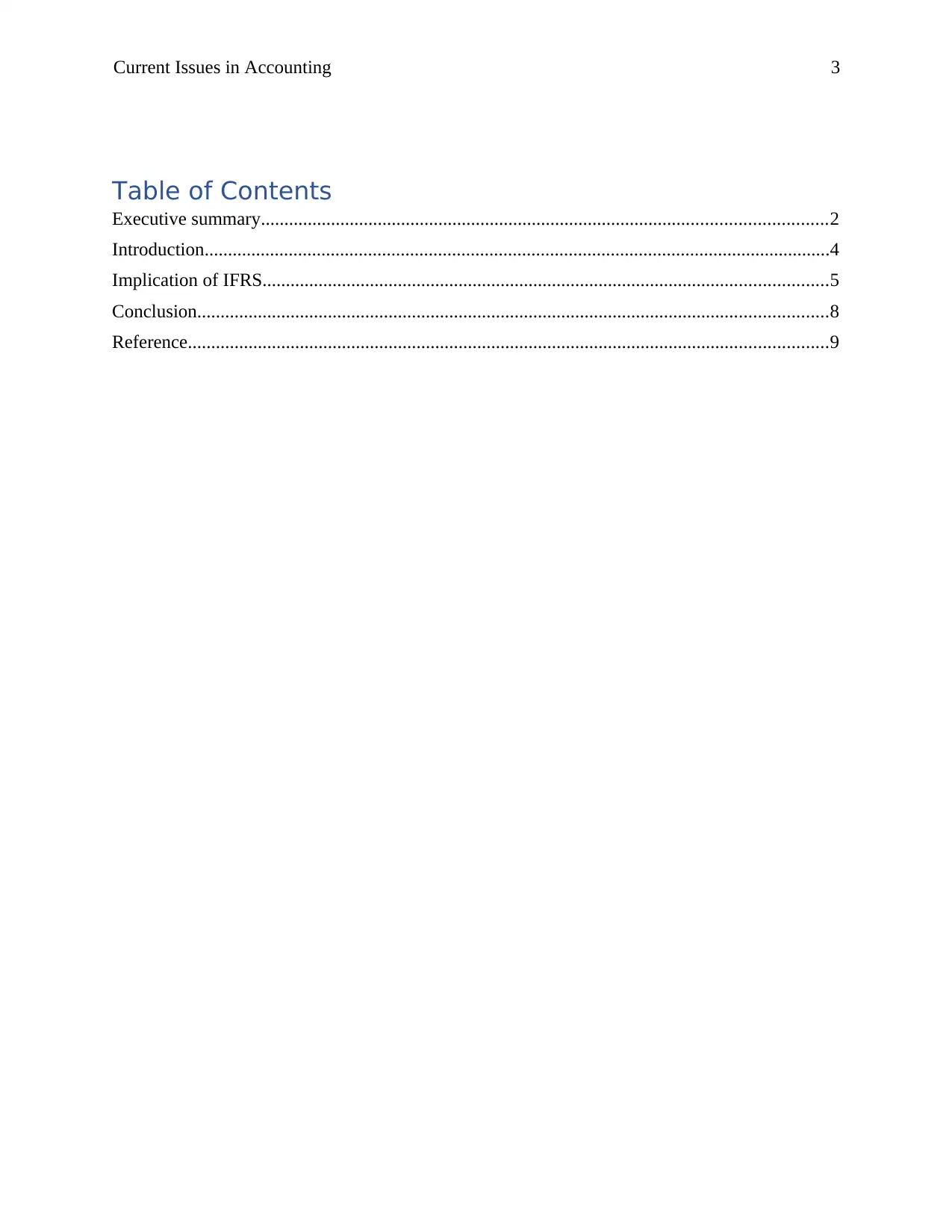
Current Issues in Accounting 3
Table of Contents
Executive summary.........................................................................................................................2
Introduction......................................................................................................................................4
Implication of IFRS.........................................................................................................................5
Conclusion.......................................................................................................................................8
Reference.........................................................................................................................................9
Table of Contents
Executive summary.........................................................................................................................2
Introduction......................................................................................................................................4
Implication of IFRS.........................................................................................................................5
Conclusion.......................................................................................................................................8
Reference.........................................................................................................................................9
⊘ This is a preview!⊘
Do you want full access?
Subscribe today to unlock all pages.

Trusted by 1+ million students worldwide
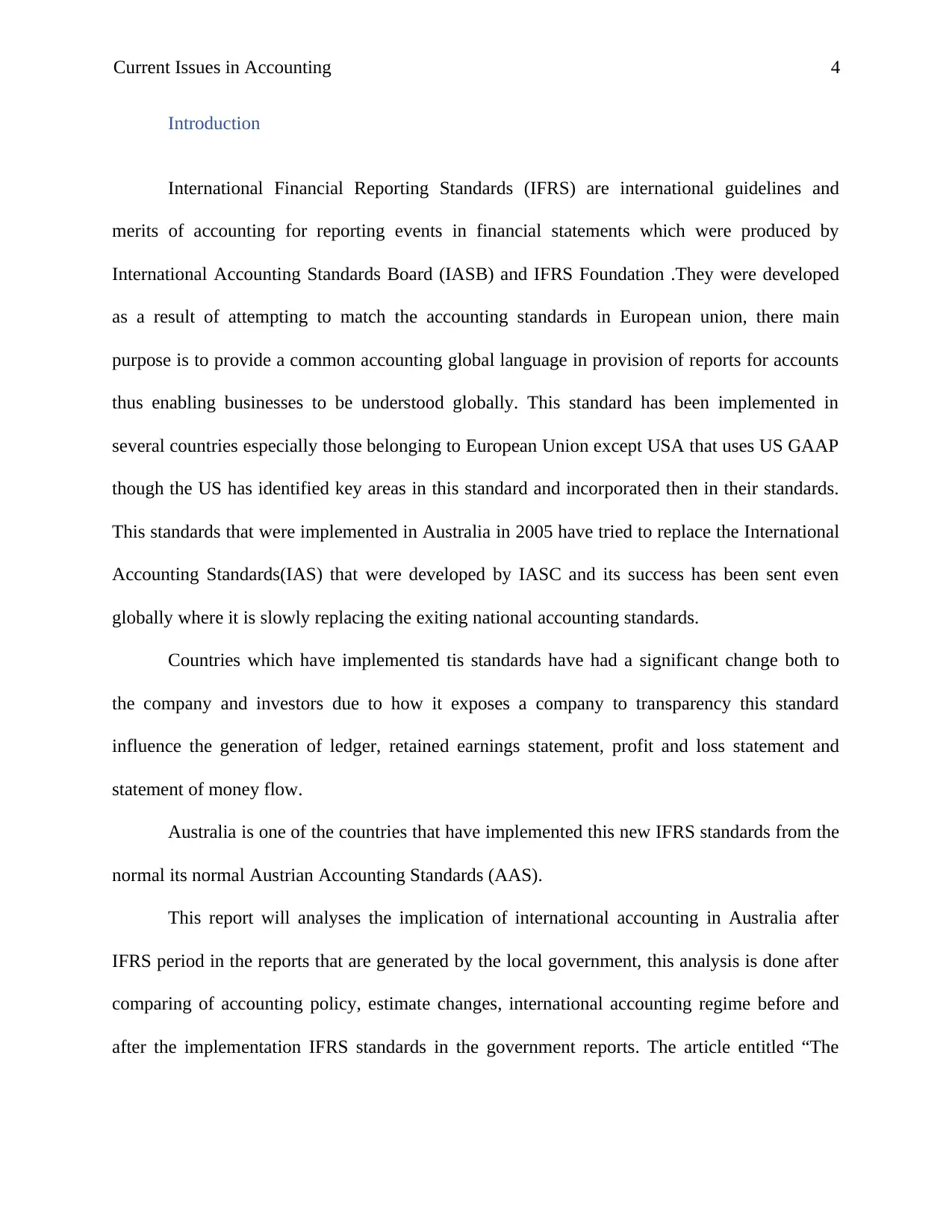
Current Issues in Accounting 4
Introduction
International Financial Reporting Standards (IFRS) are international guidelines and
merits of accounting for reporting events in financial statements which were produced by
International Accounting Standards Board (IASB) and IFRS Foundation .They were developed
as a result of attempting to match the accounting standards in European union, there main
purpose is to provide a common accounting global language in provision of reports for accounts
thus enabling businesses to be understood globally. This standard has been implemented in
several countries especially those belonging to European Union except USA that uses US GAAP
though the US has identified key areas in this standard and incorporated then in their standards.
This standards that were implemented in Australia in 2005 have tried to replace the International
Accounting Standards(IAS) that were developed by IASC and its success has been sent even
globally where it is slowly replacing the exiting national accounting standards.
Countries which have implemented tis standards have had a significant change both to
the company and investors due to how it exposes a company to transparency this standard
influence the generation of ledger, retained earnings statement, profit and loss statement and
statement of money flow.
Australia is one of the countries that have implemented this new IFRS standards from the
normal its normal Austrian Accounting Standards (AAS).
This report will analyses the implication of international accounting in Australia after
IFRS period in the reports that are generated by the local government, this analysis is done after
comparing of accounting policy, estimate changes, international accounting regime before and
after the implementation IFRS standards in the government reports. The article entitled “The
Introduction
International Financial Reporting Standards (IFRS) are international guidelines and
merits of accounting for reporting events in financial statements which were produced by
International Accounting Standards Board (IASB) and IFRS Foundation .They were developed
as a result of attempting to match the accounting standards in European union, there main
purpose is to provide a common accounting global language in provision of reports for accounts
thus enabling businesses to be understood globally. This standard has been implemented in
several countries especially those belonging to European Union except USA that uses US GAAP
though the US has identified key areas in this standard and incorporated then in their standards.
This standards that were implemented in Australia in 2005 have tried to replace the International
Accounting Standards(IAS) that were developed by IASC and its success has been sent even
globally where it is slowly replacing the exiting national accounting standards.
Countries which have implemented tis standards have had a significant change both to
the company and investors due to how it exposes a company to transparency this standard
influence the generation of ledger, retained earnings statement, profit and loss statement and
statement of money flow.
Australia is one of the countries that have implemented this new IFRS standards from the
normal its normal Austrian Accounting Standards (AAS).
This report will analyses the implication of international accounting in Australia after
IFRS period in the reports that are generated by the local government, this analysis is done after
comparing of accounting policy, estimate changes, international accounting regime before and
after the implementation IFRS standards in the government reports. The article entitled “The
Paraphrase This Document
Need a fresh take? Get an instant paraphrase of this document with our AI Paraphraser
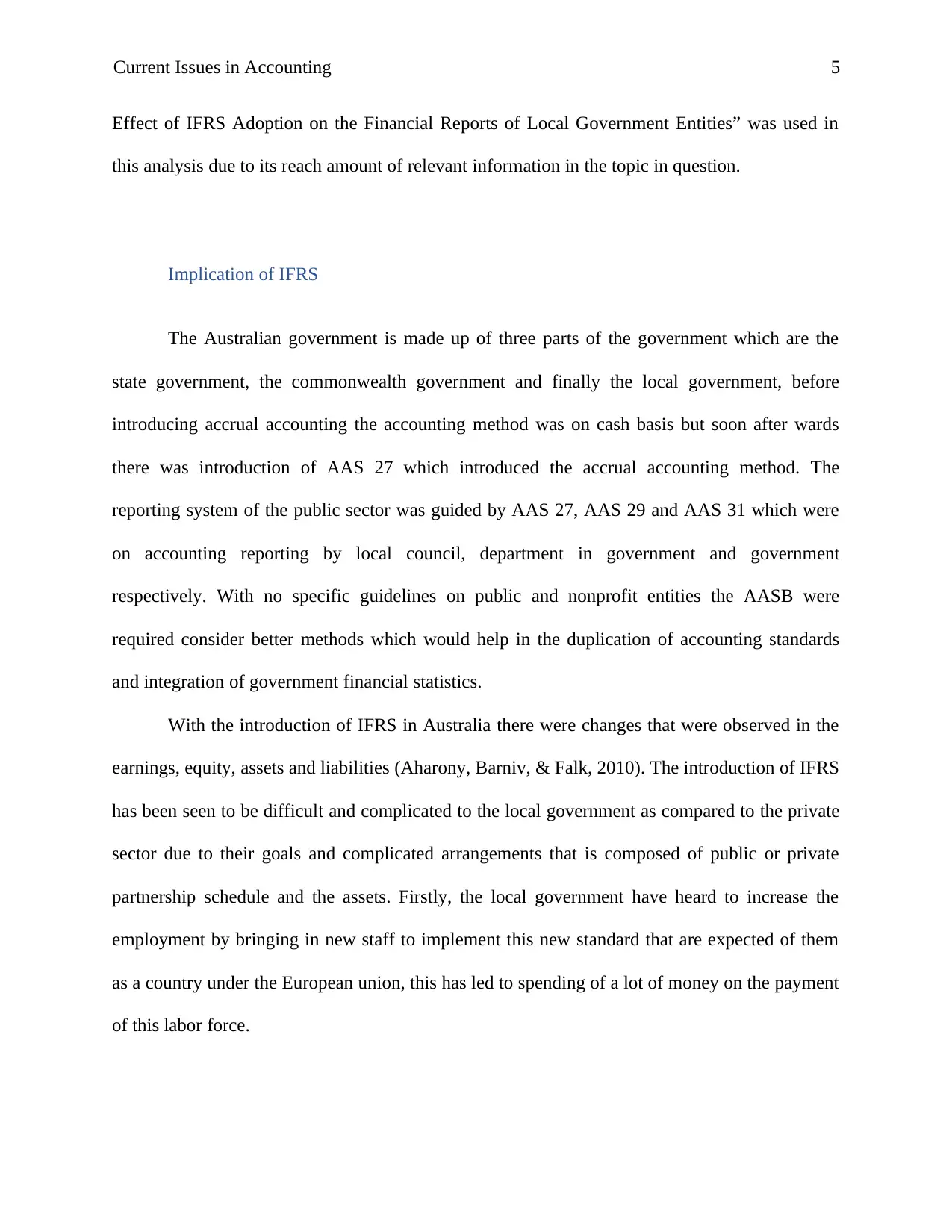
Current Issues in Accounting 5
Effect of IFRS Adoption on the Financial Reports of Local Government Entities” was used in
this analysis due to its reach amount of relevant information in the topic in question.
Implication of IFRS
The Australian government is made up of three parts of the government which are the
state government, the commonwealth government and finally the local government, before
introducing accrual accounting the accounting method was on cash basis but soon after wards
there was introduction of AAS 27 which introduced the accrual accounting method. The
reporting system of the public sector was guided by AAS 27, AAS 29 and AAS 31 which were
on accounting reporting by local council, department in government and government
respectively. With no specific guidelines on public and nonprofit entities the AASB were
required consider better methods which would help in the duplication of accounting standards
and integration of government financial statistics.
With the introduction of IFRS in Australia there were changes that were observed in the
earnings, equity, assets and liabilities (Aharony, Barniv, & Falk, 2010). The introduction of IFRS
has been seen to be difficult and complicated to the local government as compared to the private
sector due to their goals and complicated arrangements that is composed of public or private
partnership schedule and the assets. Firstly, the local government have heard to increase the
employment by bringing in new staff to implement this new standard that are expected of them
as a country under the European union, this has led to spending of a lot of money on the payment
of this labor force.
Effect of IFRS Adoption on the Financial Reports of Local Government Entities” was used in
this analysis due to its reach amount of relevant information in the topic in question.
Implication of IFRS
The Australian government is made up of three parts of the government which are the
state government, the commonwealth government and finally the local government, before
introducing accrual accounting the accounting method was on cash basis but soon after wards
there was introduction of AAS 27 which introduced the accrual accounting method. The
reporting system of the public sector was guided by AAS 27, AAS 29 and AAS 31 which were
on accounting reporting by local council, department in government and government
respectively. With no specific guidelines on public and nonprofit entities the AASB were
required consider better methods which would help in the duplication of accounting standards
and integration of government financial statistics.
With the introduction of IFRS in Australia there were changes that were observed in the
earnings, equity, assets and liabilities (Aharony, Barniv, & Falk, 2010). The introduction of IFRS
has been seen to be difficult and complicated to the local government as compared to the private
sector due to their goals and complicated arrangements that is composed of public or private
partnership schedule and the assets. Firstly, the local government have heard to increase the
employment by bringing in new staff to implement this new standard that are expected of them
as a country under the European union, this has led to spending of a lot of money on the payment
of this labor force.
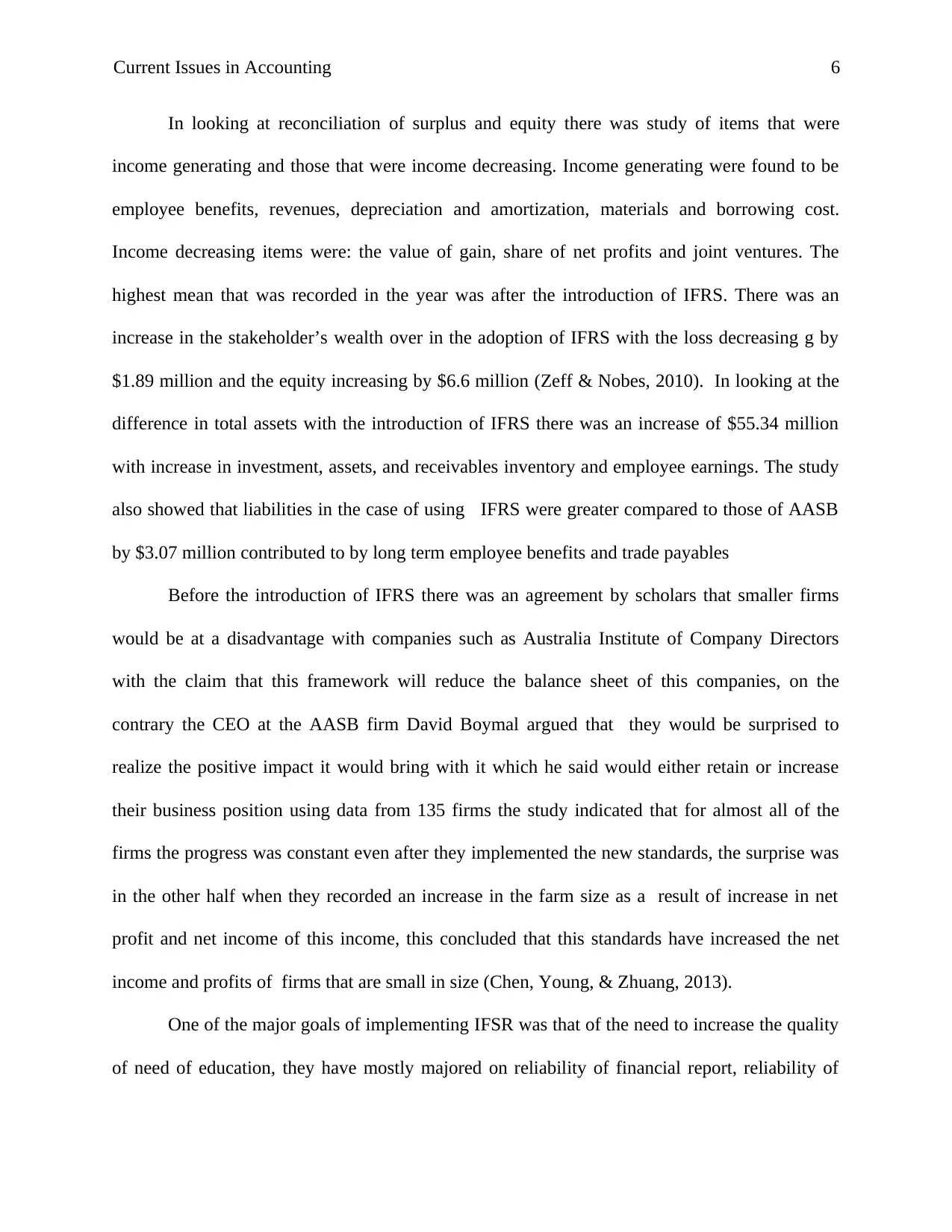
Current Issues in Accounting 6
In looking at reconciliation of surplus and equity there was study of items that were
income generating and those that were income decreasing. Income generating were found to be
employee benefits, revenues, depreciation and amortization, materials and borrowing cost.
Income decreasing items were: the value of gain, share of net profits and joint ventures. The
highest mean that was recorded in the year was after the introduction of IFRS. There was an
increase in the stakeholder’s wealth over in the adoption of IFRS with the loss decreasing g by
$1.89 million and the equity increasing by $6.6 million (Zeff & Nobes, 2010). In looking at the
difference in total assets with the introduction of IFRS there was an increase of $55.34 million
with increase in investment, assets, and receivables inventory and employee earnings. The study
also showed that liabilities in the case of using IFRS were greater compared to those of AASB
by $3.07 million contributed to by long term employee benefits and trade payables
Before the introduction of IFRS there was an agreement by scholars that smaller firms
would be at a disadvantage with companies such as Australia Institute of Company Directors
with the claim that this framework will reduce the balance sheet of this companies, on the
contrary the CEO at the AASB firm David Boymal argued that they would be surprised to
realize the positive impact it would bring with it which he said would either retain or increase
their business position using data from 135 firms the study indicated that for almost all of the
firms the progress was constant even after they implemented the new standards, the surprise was
in the other half when they recorded an increase in the farm size as a result of increase in net
profit and net income of this income, this concluded that this standards have increased the net
income and profits of firms that are small in size (Chen, Young, & Zhuang, 2013).
One of the major goals of implementing IFSR was that of the need to increase the quality
of need of education, they have mostly majored on reliability of financial report, reliability of
In looking at reconciliation of surplus and equity there was study of items that were
income generating and those that were income decreasing. Income generating were found to be
employee benefits, revenues, depreciation and amortization, materials and borrowing cost.
Income decreasing items were: the value of gain, share of net profits and joint ventures. The
highest mean that was recorded in the year was after the introduction of IFRS. There was an
increase in the stakeholder’s wealth over in the adoption of IFRS with the loss decreasing g by
$1.89 million and the equity increasing by $6.6 million (Zeff & Nobes, 2010). In looking at the
difference in total assets with the introduction of IFRS there was an increase of $55.34 million
with increase in investment, assets, and receivables inventory and employee earnings. The study
also showed that liabilities in the case of using IFRS were greater compared to those of AASB
by $3.07 million contributed to by long term employee benefits and trade payables
Before the introduction of IFRS there was an agreement by scholars that smaller firms
would be at a disadvantage with companies such as Australia Institute of Company Directors
with the claim that this framework will reduce the balance sheet of this companies, on the
contrary the CEO at the AASB firm David Boymal argued that they would be surprised to
realize the positive impact it would bring with it which he said would either retain or increase
their business position using data from 135 firms the study indicated that for almost all of the
firms the progress was constant even after they implemented the new standards, the surprise was
in the other half when they recorded an increase in the farm size as a result of increase in net
profit and net income of this income, this concluded that this standards have increased the net
income and profits of firms that are small in size (Chen, Young, & Zhuang, 2013).
One of the major goals of implementing IFSR was that of the need to increase the quality
of need of education, they have mostly majored on reliability of financial report, reliability of
⊘ This is a preview!⊘
Do you want full access?
Subscribe today to unlock all pages.

Trusted by 1+ million students worldwide
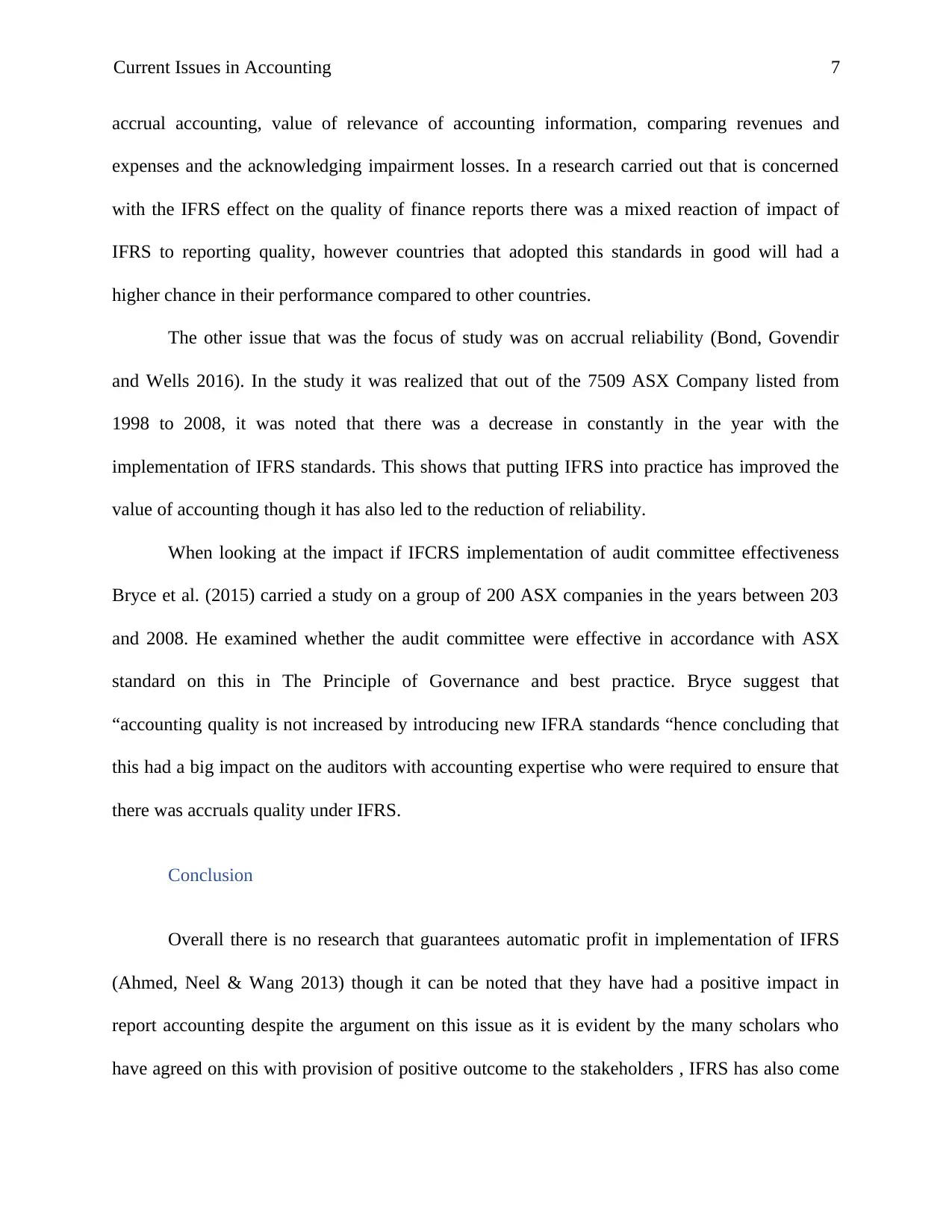
Current Issues in Accounting 7
accrual accounting, value of relevance of accounting information, comparing revenues and
expenses and the acknowledging impairment losses. In a research carried out that is concerned
with the IFRS effect on the quality of finance reports there was a mixed reaction of impact of
IFRS to reporting quality, however countries that adopted this standards in good will had a
higher chance in their performance compared to other countries.
The other issue that was the focus of study was on accrual reliability (Bond, Govendir
and Wells 2016). In the study it was realized that out of the 7509 ASX Company listed from
1998 to 2008, it was noted that there was a decrease in constantly in the year with the
implementation of IFRS standards. This shows that putting IFRS into practice has improved the
value of accounting though it has also led to the reduction of reliability.
When looking at the impact if IFCRS implementation of audit committee effectiveness
Bryce et al. (2015) carried a study on a group of 200 ASX companies in the years between 203
and 2008. He examined whether the audit committee were effective in accordance with ASX
standard on this in The Principle of Governance and best practice. Bryce suggest that
“accounting quality is not increased by introducing new IFRA standards “hence concluding that
this had a big impact on the auditors with accounting expertise who were required to ensure that
there was accruals quality under IFRS.
Conclusion
Overall there is no research that guarantees automatic profit in implementation of IFRS
(Ahmed, Neel & Wang 2013) though it can be noted that they have had a positive impact in
report accounting despite the argument on this issue as it is evident by the many scholars who
have agreed on this with provision of positive outcome to the stakeholders , IFRS has also come
accrual accounting, value of relevance of accounting information, comparing revenues and
expenses and the acknowledging impairment losses. In a research carried out that is concerned
with the IFRS effect on the quality of finance reports there was a mixed reaction of impact of
IFRS to reporting quality, however countries that adopted this standards in good will had a
higher chance in their performance compared to other countries.
The other issue that was the focus of study was on accrual reliability (Bond, Govendir
and Wells 2016). In the study it was realized that out of the 7509 ASX Company listed from
1998 to 2008, it was noted that there was a decrease in constantly in the year with the
implementation of IFRS standards. This shows that putting IFRS into practice has improved the
value of accounting though it has also led to the reduction of reliability.
When looking at the impact if IFCRS implementation of audit committee effectiveness
Bryce et al. (2015) carried a study on a group of 200 ASX companies in the years between 203
and 2008. He examined whether the audit committee were effective in accordance with ASX
standard on this in The Principle of Governance and best practice. Bryce suggest that
“accounting quality is not increased by introducing new IFRA standards “hence concluding that
this had a big impact on the auditors with accounting expertise who were required to ensure that
there was accruals quality under IFRS.
Conclusion
Overall there is no research that guarantees automatic profit in implementation of IFRS
(Ahmed, Neel & Wang 2013) though it can be noted that they have had a positive impact in
report accounting despite the argument on this issue as it is evident by the many scholars who
have agreed on this with provision of positive outcome to the stakeholders , IFRS has also come
Paraphrase This Document
Need a fresh take? Get an instant paraphrase of this document with our AI Paraphraser
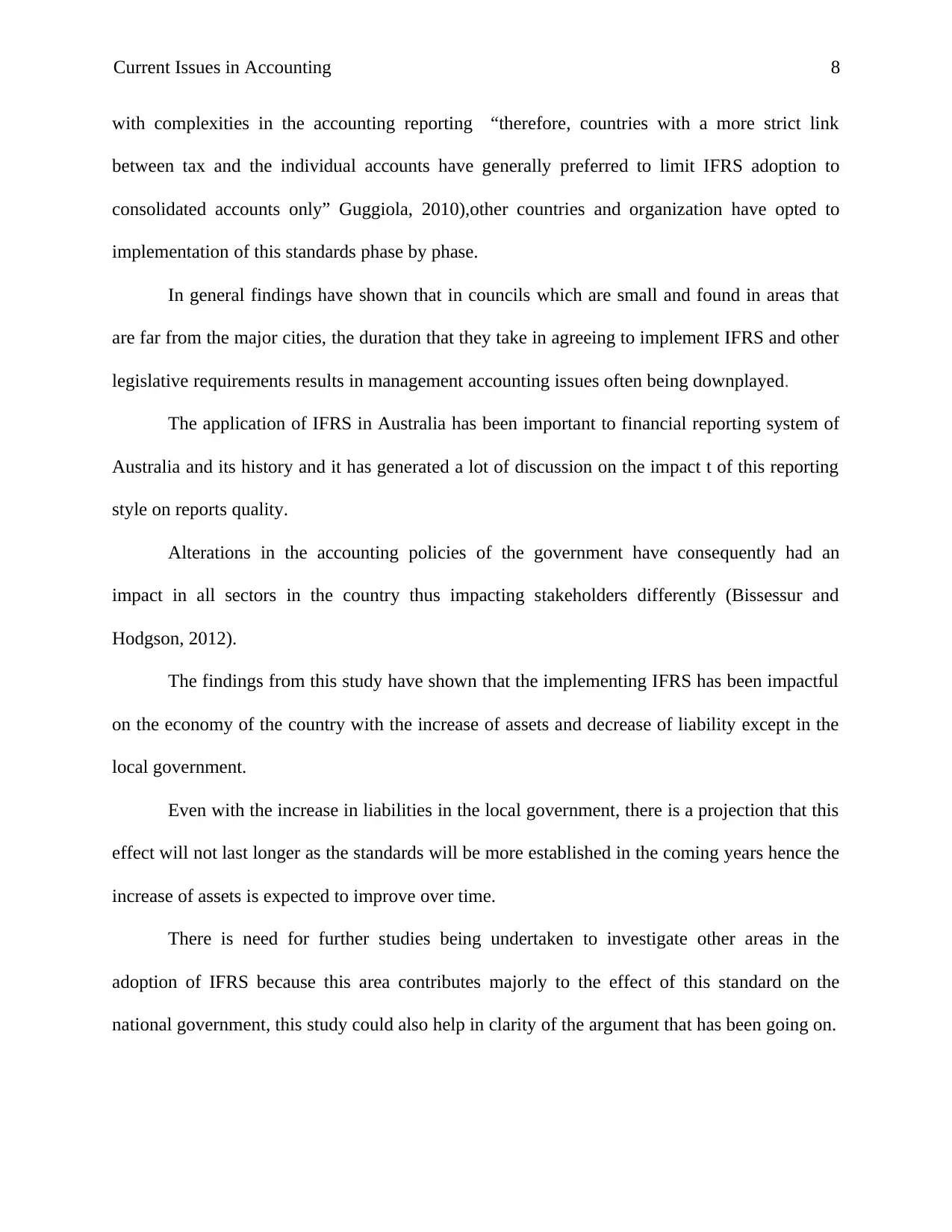
Current Issues in Accounting 8
with complexities in the accounting reporting “therefore, countries with a more strict link
between tax and the individual accounts have generally preferred to limit IFRS adoption to
consolidated accounts only” Guggiola, 2010),other countries and organization have opted to
implementation of this standards phase by phase.
In general findings have shown that in councils which are small and found in areas that
are far from the major cities, the duration that they take in agreeing to implement IFRS and other
legislative requirements results in management accounting issues often being downplayed.
The application of IFRS in Australia has been important to financial reporting system of
Australia and its history and it has generated a lot of discussion on the impact t of this reporting
style on reports quality.
Alterations in the accounting policies of the government have consequently had an
impact in all sectors in the country thus impacting stakeholders differently (Bissessur and
Hodgson, 2012).
The findings from this study have shown that the implementing IFRS has been impactful
on the economy of the country with the increase of assets and decrease of liability except in the
local government.
Even with the increase in liabilities in the local government, there is a projection that this
effect will not last longer as the standards will be more established in the coming years hence the
increase of assets is expected to improve over time.
There is need for further studies being undertaken to investigate other areas in the
adoption of IFRS because this area contributes majorly to the effect of this standard on the
national government, this study could also help in clarity of the argument that has been going on.
with complexities in the accounting reporting “therefore, countries with a more strict link
between tax and the individual accounts have generally preferred to limit IFRS adoption to
consolidated accounts only” Guggiola, 2010),other countries and organization have opted to
implementation of this standards phase by phase.
In general findings have shown that in councils which are small and found in areas that
are far from the major cities, the duration that they take in agreeing to implement IFRS and other
legislative requirements results in management accounting issues often being downplayed.
The application of IFRS in Australia has been important to financial reporting system of
Australia and its history and it has generated a lot of discussion on the impact t of this reporting
style on reports quality.
Alterations in the accounting policies of the government have consequently had an
impact in all sectors in the country thus impacting stakeholders differently (Bissessur and
Hodgson, 2012).
The findings from this study have shown that the implementing IFRS has been impactful
on the economy of the country with the increase of assets and decrease of liability except in the
local government.
Even with the increase in liabilities in the local government, there is a projection that this
effect will not last longer as the standards will be more established in the coming years hence the
increase of assets is expected to improve over time.
There is need for further studies being undertaken to investigate other areas in the
adoption of IFRS because this area contributes majorly to the effect of this standard on the
national government, this study could also help in clarity of the argument that has been going on.
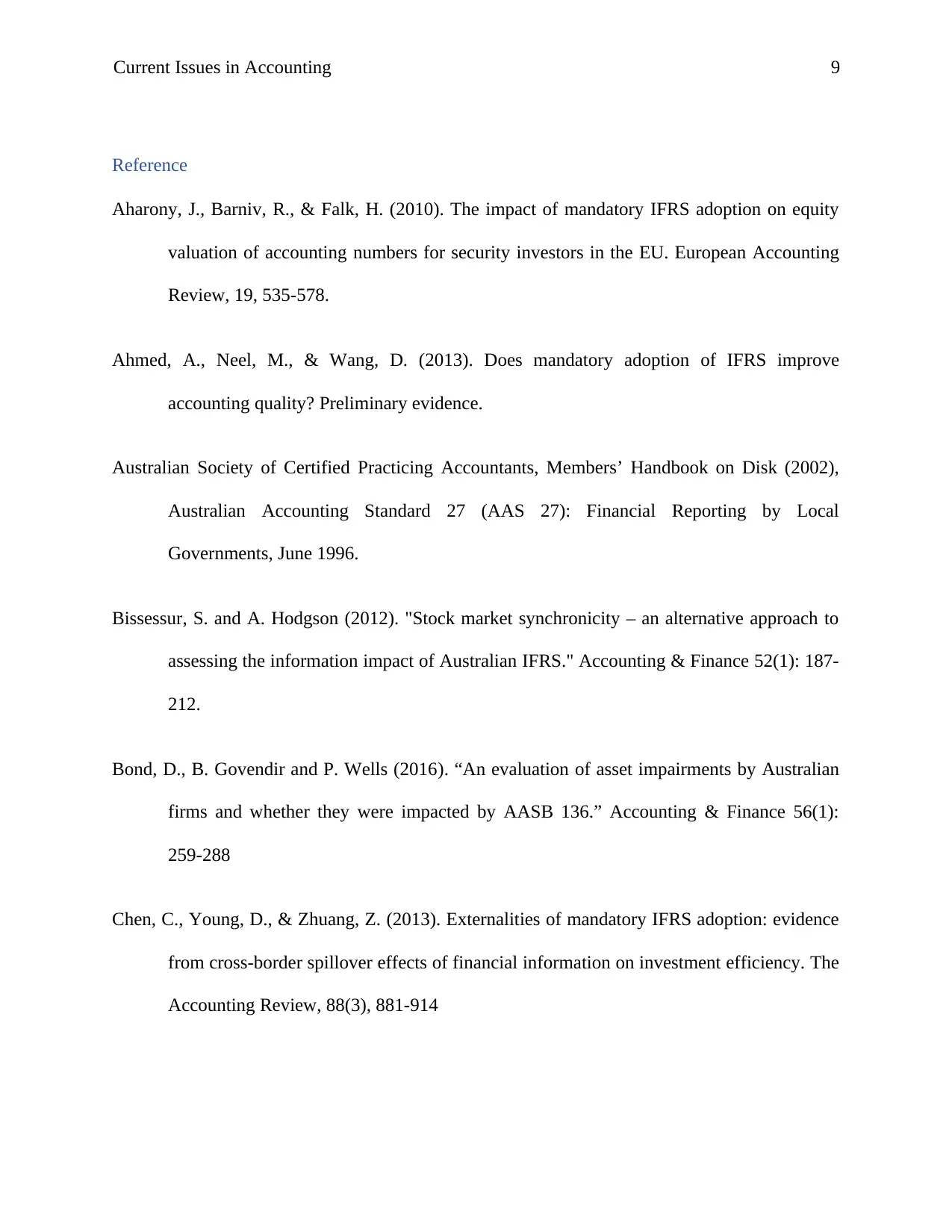
Current Issues in Accounting 9
Reference
Aharony, J., Barniv, R., & Falk, H. (2010). The impact of mandatory IFRS adoption on equity
valuation of accounting numbers for security investors in the EU. European Accounting
Review, 19, 535-578.
Ahmed, A., Neel, M., & Wang, D. (2013). Does mandatory adoption of IFRS improve
accounting quality? Preliminary evidence.
Australian Society of Certified Practicing Accountants, Members’ Handbook on Disk (2002),
Australian Accounting Standard 27 (AAS 27): Financial Reporting by Local
Governments, June 1996.
Bissessur, S. and A. Hodgson (2012). "Stock market synchronicity – an alternative approach to
assessing the information impact of Australian IFRS." Accounting & Finance 52(1): 187-
212.
Bond, D., B. Govendir and P. Wells (2016). “An evaluation of asset impairments by Australian
firms and whether they were impacted by AASB 136.” Accounting & Finance 56(1):
259-288
Chen, C., Young, D., & Zhuang, Z. (2013). Externalities of mandatory IFRS adoption: evidence
from cross-border spillover effects of financial information on investment efficiency. The
Accounting Review, 88(3), 881-914
Reference
Aharony, J., Barniv, R., & Falk, H. (2010). The impact of mandatory IFRS adoption on equity
valuation of accounting numbers for security investors in the EU. European Accounting
Review, 19, 535-578.
Ahmed, A., Neel, M., & Wang, D. (2013). Does mandatory adoption of IFRS improve
accounting quality? Preliminary evidence.
Australian Society of Certified Practicing Accountants, Members’ Handbook on Disk (2002),
Australian Accounting Standard 27 (AAS 27): Financial Reporting by Local
Governments, June 1996.
Bissessur, S. and A. Hodgson (2012). "Stock market synchronicity – an alternative approach to
assessing the information impact of Australian IFRS." Accounting & Finance 52(1): 187-
212.
Bond, D., B. Govendir and P. Wells (2016). “An evaluation of asset impairments by Australian
firms and whether they were impacted by AASB 136.” Accounting & Finance 56(1):
259-288
Chen, C., Young, D., & Zhuang, Z. (2013). Externalities of mandatory IFRS adoption: evidence
from cross-border spillover effects of financial information on investment efficiency. The
Accounting Review, 88(3), 881-914
⊘ This is a preview!⊘
Do you want full access?
Subscribe today to unlock all pages.

Trusted by 1+ million students worldwide
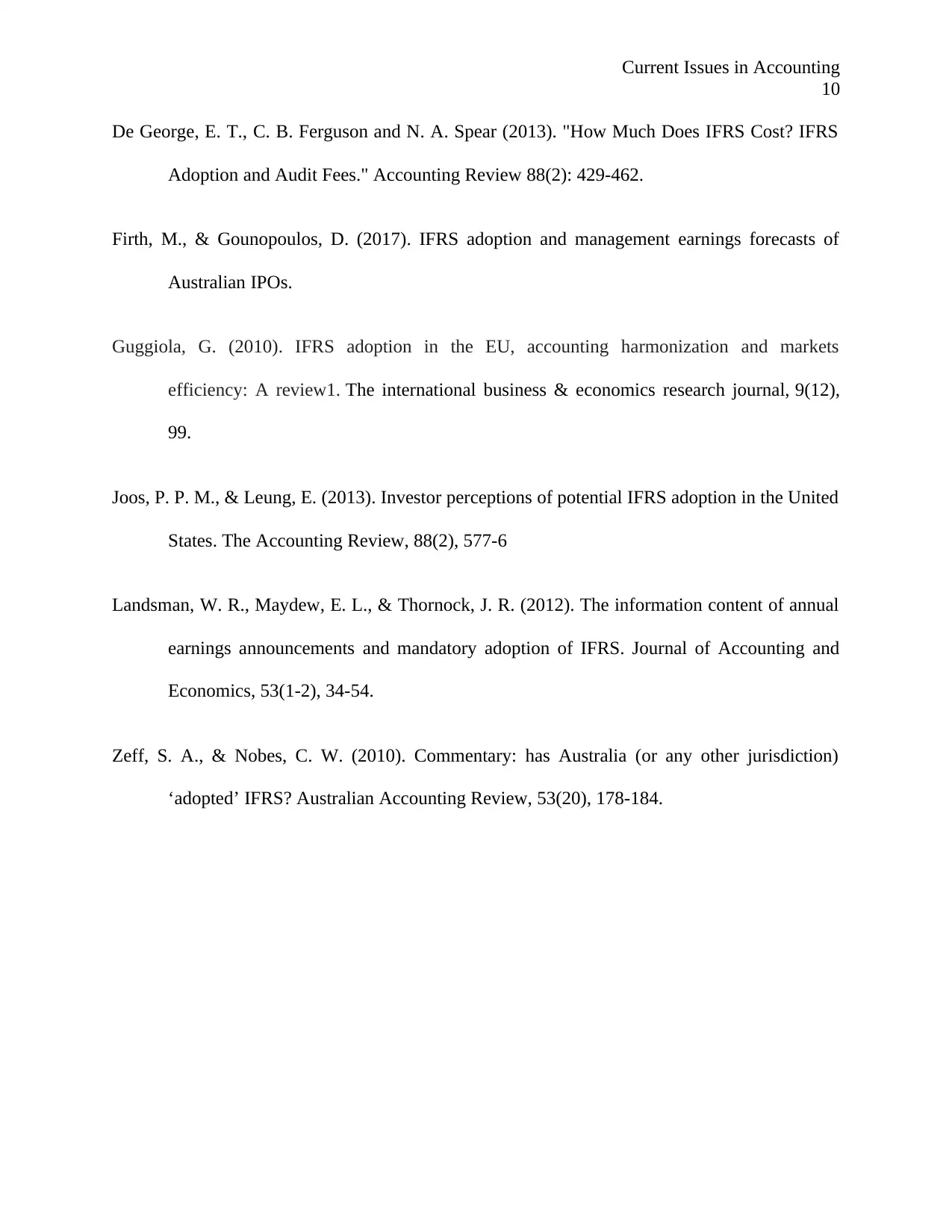
Current Issues in Accounting
10
De George, E. T., C. B. Ferguson and N. A. Spear (2013). "How Much Does IFRS Cost? IFRS
Adoption and Audit Fees." Accounting Review 88(2): 429-462.
Firth, M., & Gounopoulos, D. (2017). IFRS adoption and management earnings forecasts of
Australian IPOs.
Guggiola, G. (2010). IFRS adoption in the EU, accounting harmonization and markets
efficiency: A review1. The international business & economics research journal, 9(12),
99.
Joos, P. P. M., & Leung, E. (2013). Investor perceptions of potential IFRS adoption in the United
States. The Accounting Review, 88(2), 577-6
Landsman, W. R., Maydew, E. L., & Thornock, J. R. (2012). The information content of annual
earnings announcements and mandatory adoption of IFRS. Journal of Accounting and
Economics, 53(1-2), 34-54.
Zeff, S. A., & Nobes, C. W. (2010). Commentary: has Australia (or any other jurisdiction)
‘adopted’ IFRS? Australian Accounting Review, 53(20), 178-184.
10
De George, E. T., C. B. Ferguson and N. A. Spear (2013). "How Much Does IFRS Cost? IFRS
Adoption and Audit Fees." Accounting Review 88(2): 429-462.
Firth, M., & Gounopoulos, D. (2017). IFRS adoption and management earnings forecasts of
Australian IPOs.
Guggiola, G. (2010). IFRS adoption in the EU, accounting harmonization and markets
efficiency: A review1. The international business & economics research journal, 9(12),
99.
Joos, P. P. M., & Leung, E. (2013). Investor perceptions of potential IFRS adoption in the United
States. The Accounting Review, 88(2), 577-6
Landsman, W. R., Maydew, E. L., & Thornock, J. R. (2012). The information content of annual
earnings announcements and mandatory adoption of IFRS. Journal of Accounting and
Economics, 53(1-2), 34-54.
Zeff, S. A., & Nobes, C. W. (2010). Commentary: has Australia (or any other jurisdiction)
‘adopted’ IFRS? Australian Accounting Review, 53(20), 178-184.
1 out of 10
Related Documents
Your All-in-One AI-Powered Toolkit for Academic Success.
+13062052269
info@desklib.com
Available 24*7 on WhatsApp / Email
![[object Object]](/_next/static/media/star-bottom.7253800d.svg)
Unlock your academic potential
Copyright © 2020–2026 A2Z Services. All Rights Reserved. Developed and managed by ZUCOL.




